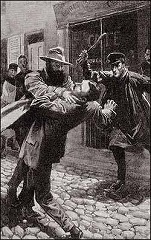Already the mystery began to define itself, as figures grow clearer with the lifting of a fog. Here was this good and pious lady pursued from place to place by a sinister and unrelenting figure. She feared him, or she would not have fled from Lausanne. He had still followed. Sooner or later he would overtake her. Had he already overtaken her? Was that the secret of her continued silence? Could the good people who were her companions not screen her from his violence or his blackmail? What horrible purpose, what deep design, lay behind this long pursuit? There was the problem which I had to solve.
To Holmes I wrote showing how rapidly and surely I had got down to the roots of the matter. In reply I had a telegram asking for a description of Dr. Shlessinger’s left ear. Holmes’s ideas of humour are strange and occasionally offensive, so I took no notice of his ill-timed jest - indeed, I had already reached Montpellier in my pursuit of the maid, Marie, before his message came.
I had no difficulty in finding the ex-servant and in learning all that she could tell me. She was a devoted creature, who had only left her mistress because she was sure that she was in good hands, and because her own approaching marriage made a separation inevitable in any case. Her mistress had, as she confessed with distress, shown some irritability of temper towards her during their stay in Baden, and had even questioned her once as if she had suspicions of her honesty, and this had made the parting easier than it would otherwise have been. Lady Frances had given her fifty pounds as a wedding-present. Like me, Marie viewed with deep distrust the stranger who had driven her mistress from Lausanne. With her own eyes she had seen him seize the lady’s wrist with great violence on the public promenade by the lake. He was a fierce and terrible man. She believed that it was out of dread of him that Lady Frances had accepted the escort of the Shlessingers to London. She had never spoken to Marie about it, but many little signs had convinced the maid that her mistress lived in a state of continual nervous apprehension. So far she had got in her narrative, when suddenly she sprang from her chair and her face was convulsed with surprise and fear. “See!” she cried. “The miscreant follows still! There is the very man of whom I speak.”
Through the open sitting-room window I saw a huge, swarthy man with a bristling black beard walking slowly down the centre of the street and staring eagerly at the numbers of the houses. It was clear that, like myself, he was on the track of the maid. Acting upon the impulse of the moment, I rushed out and accosted him.
“You are an Englishman,” I said.
“What if I am?” he asked with a most villainous scowl.
“May I ask what your name is?”
“No, you may not,” said he with decision.
The situation was awkward, but the most direct way is often the best.
“Where is the Lady Frances Carfax?” I asked.
He stared at me in amazement.
“What have you done with her? Why have you pursued her? I insist upon an answer!” said I.

The fellow gave a bellow of anger and sprang upon me like a tiger. I have held my own in many a struggle, but the man had a grip of iron and the fury of a fiend. His hand was on my throat and my senses were nearly gone before an unshaven French ouvrier in a blue blouse darted out from a cabaret opposite, with a cudgel in his hand, and struck my assailant a sharp crack over the forearm, which made him leave go his hold. He stood for an instant fuming with rage and uncertain whether he should not renew his attack. Then, with a snarl of anger, he left me and entered the cottage from which I had just come. I turned to thank my preserver, who stood beside me in the roadway.